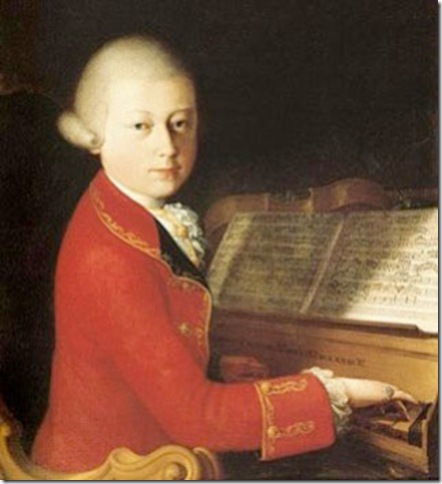Composers are not like Athena, who burst fully formed and armed for battle from the head of Zeus.
Forging an individual style is in part a reflection of who the composer is, but also who that composer has studied and listened to. Even someone as miraculous as Mozart had plenty of models for his work, and the Miami concert choir Seraphic Fire goes in search of those musical ancestors and influencers in its concerts this week.
Appearing in an annual special runout at St. Mark’s Episcopal Church in Palm Beach Gardens on Thursday night, the choir was joined by members of the New York early music group The Sebastians in a survey of pieces by Palestrina, Victoria, Biber, Zelenka, Martini and J.S. Bach, bookended by two performances of Mozart’s popular tiny late motet, Ave verum corpus (K. 618).
The composers chosen by founder and director Patrick Dupré Quigley were justifiable in terms of influence on Mozart in the largest view, though more direct influences such as Pergolesi, Michael Haydn and especially J.C. Bach were not on the program. Nonetheless, this was a beautiful and well-sung concert with some terrific surprises.
One of them was a motet by Giovanni Battista Martini, the priest and pedagogue known by one and all as Padre Martini, who met and corresponded with Mozart; there is no direct evidence that Martini taught the teenage Mozart, but it’s hard to believe he didn’t. Martini’s Jerusalem, surge sounded cool and timelessly lovely, as did two earlier motets, Palestrina’s Sicut cervus and an abbreviated version of Victoria’s O magnum mysterium; both of these Renaissance works, and the Victoria in particular, were shaky here and there, largely because the choir was standing in a line at the back of the altar, making ensemble a tricky affair.
Along with the Martini came a fine discovery, Mozart’s offertory Venite, populi (K. 260), written for Ascension Day in 1776. This is a delightful piece, full of energy and brilliant counterpoint; Quigley led it with his usual forceful, energetic hand, and the Sebastians gave it plenty of fire. The choir sounded excellent, and it suggested that a whole program of Mozart’s lesser-known liturgical music might make a truly enlightening program.
Quigley and his team also presented excerpts from another interesting, little-known work, the Miserere (in C minor, ZWV 57) of the Czech composer Jan Dismas Zelenka (1679-1745). The full Sebastians complement — two violins, a viola and cello, two oboes, bassoon, theorbo and positif organ — was on hand for this remarkably powerful, intense music in which a plea for divine mercy in the face of personal iniquity was vividly realized. Soprano Margot Rood was the expert soloist for the Gloria, patri; she has a beautifully even instrument that allows her to sing with bell-like clarity in all registers, and the faintly melancholy timbre of her voice makes her work that much more communicative.
More good solo work came from soprano Molly Quinn in the first movement of Vivaldi’s motet Nulla in mundo pax (RV 630), an aria that’s a close cousin to the Domine Deus of the composer’s well-known Gloria. Quinn, who has a big, pretty voice, sang with strength and confidence, though sometimes with some harshness at the end of a line or two, which can be attributed to the tempo here, which felt slightly rushed. Also on the program was an instrumental piece, a trio sonata by Henrich Biber, a fairly bland work that was rescued by its moments of 17th-century hoedown from violinists Nicholas DiEugenio and Daniel Lee, the founder of the Sebastians.
The highlight of the concert came with five movements from the cantatas of J.S. Bach, a composer Mozart revered. It would be wonderful to see a Bach cantata series down here in South Florida, but until such time as that comes together, Thursday’s performance will have to hold us. The choir gave marvelous readings of the choruses Nun komm, der Heiden Heiland (BWV 62) and Bleib bei uns, den es will Abend warden (BWV 6), and a spectacular, joyous performance of the opening chorus from the fifth section of the Christmas Oratorio (BWV 248): Ehre sei dir, Gott, gesungen. Quigley bobbed back and forth, as did choristers and members of the audience, as this propulsive music chugged on to its radiant conclusion.
Countertenor Michael Wisdom was an uneven soloist in the difficult aria Ich wünsche nur bei Gott, from the cantata Geist und Seele wird verwirret (BWV 35). He has a lovely voice, but he had some trouble with a cadential formula early on; again, perhaps a slightly slower tempo would have helped. Alto Virginia Warnken was a very fine soloist in the single-movement cantata Bekennen will ich seinen Namen (BWV 200), which features one of Bach’s most endearing melodies. Warnken’s dark, rich voice was a pleasure to hear, especially because she deployed it with such elegance and taste.
As noted, the concert closed and opened with Ave verum corpus. Both times, Quigley and his forces paid very careful attention to dynamics and bringing out harmonic changes, which is the chief glory of this beautiful little piece. I don’t know that hearing it again after a night of other pieces was entirely revelatory: It sounded just as unique and ravishing as it did when it opened the concert, though perhaps even more so the second time around.
The audience at St. Mark’s was fervently enthusiastic, standing several times during the concert to applaud this remarkable performing group that has added so much to South Florida’s cultural scene. Now if we can only talk them into that Bach cantata pilgrimage, we’ll really have something.
Seraphic Fire presents this program again tonight at 7:30 at St. Philip’s Episcopal Church in Coral Gables, at 8 p.m. Saturday at All Saints Episcopal in Fort Lauderdale, and at 4 p.m. Sunday at All Souls Episcopal in Miami Beach. Call 305-285-9060 or visit www.seraphicfire.org.
